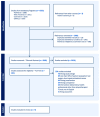Interventions Provided by Physiotherapists to Prevent Complications After Major Gastrointestinal Cancer Surgery: A Systematic Review and Meta-Analysis
- PMID: 40002270
- PMCID: PMC11853706
- DOI: 10.3390/cancers17040676
Interventions Provided by Physiotherapists to Prevent Complications After Major Gastrointestinal Cancer Surgery: A Systematic Review and Meta-Analysis
Abstract
Background/objectives: Major surgery for gastrointestinal cancer carries a 50% risk of postoperative complications. Physiotherapists commonly provide interventions to patients undergoing gastrointestinal surgery for cancer with the intent of preventing complications and improving recovery. However, the evidence is unclear if physiotherapy is effective compared to providing no physiotherapy, nor if timing of service delivery during the perioperative pathway influences outcomes. The objective of this review is to evaluate and synthesise the evidence examining the effects of perioperative physiotherapy interventions delivered with prophylactic intent on postoperative outcomes compared to no treatment or early mobilisation alone.
Methods: A protocol was prospectively registered with PROSPERO and a systematic review performed of four databases. Randomised controlled trials examining prophylactic physiotherapy interventions in adults undergoing gastrointestinal surgery for cancer were eligible for inclusion.
Results: Nine publications from eight randomised controlled trials were included with a total sample of 1418 participants. Due to inconsistent reporting of other perioperative complications, meta-analysis of the effect of physiotherapy was only possible specific to postoperative pulmonary complications (PPCs). This found an estimated 59% reduction in risk with exposure to physiotherapy interventions (RR 0.41, 95%CI 0.23 to 0.73, p < 0.001). Sub-group analysis demonstrated that timing of delivery may be important, with physiotherapy delivered only in the preoperative phase or combined with a postoperative service significantly reducing PPC risk (RR 0.32, 95%CI 0.17 to 0.60, p < 0.001) and hospital length of stay (MD-1.4 days, 95%CI -2.24 to -0.58, p = 0.01), whilst the effect of postoperative physiotherapy alone was less certain.
Conclusions: Preoperative-alone and perioperative physiotherapy is likely to minimise the risk of PPCs in patients undergoing gastrointestinal surgery for cancer. This challenges current traditional paradigms of providing physiotherapy only in the postoperative phase of surgery. A review with broader scope and component network analysis is required to confirm this.
Keywords: gastrointestinal cancer; gastrointestinal surgery; length of stay; perioperative; physiotherapy; pneumonia; postoperative; postoperative complications; postoperative pulmonary complications; preoperative.
Conflict of interest statement
The authors declare no conflicts of interest.
Figures






References
-
- van Kooten R.T., Bahadoer R.R., Peeters K., Hoeksema J.H.L., Steyerberg E.W., Hartgrink H.H., van de Velde C.J.H., Wouters M., Tollenaar R. Preoperative Risk Factors for Major Postoperative Complications after Complex Gastrointestinal Cancer Surgery: A Systematic Review. Eur. J. Surg. Oncol. 2021;47:3049–3058. doi: 10.1016/j.ejso.2021.07.021. - DOI - PubMed
-
- Busweiler L., Henneman D., Dikken J., Fiocco M., van Berge Henegouwen M., Wijnhoven B., van Hillegersberg R., Rosman C., Wouters M., van Sandick J. Failure-to-Rescue in Patients Undergoing Surgery for Esophageal or Gastric Cancer. Eur. J. Surg. Oncol. 2017;43:1962–1969. doi: 10.1016/j.ejso.2017.07.005. - DOI - PubMed
-
- Chen G., Wang J., Chen K., Kang M., Zhang H., Jin X., Lin L., Chen J. Relationship between Postoperative Complications and the Prognosis of Gastric Carcinoma Patients Who Underwent Surgical Resection: A Systematic Review and Meta-Analysis. Cancer Control. 2021;28:10732748211011955. doi: 10.1177/10732748211011955. - DOI - PMC - PubMed
-
- Boden I., Denehy L. Respiratory Prehabilitation for the Prevention of Postoperative Pulmonary Complications after Major Surgery. Curr. Anesthesiol. Rep. 2022;12:44–58. doi: 10.1007/s40140-021-00495-w. - DOI
Publication types
Grants and funding
LinkOut - more resources
Full Text Sources

